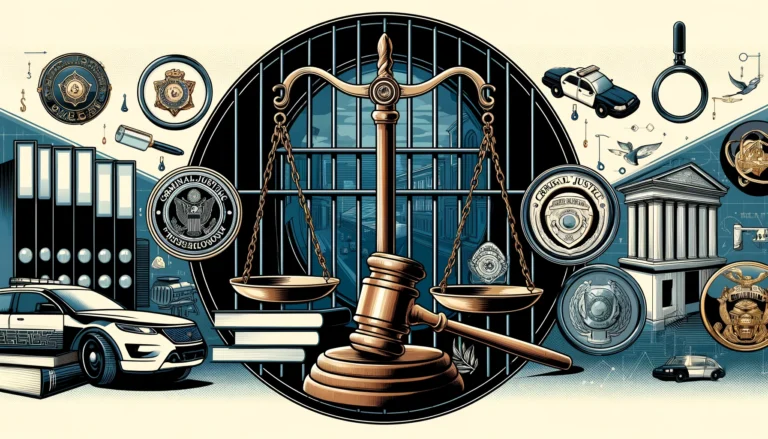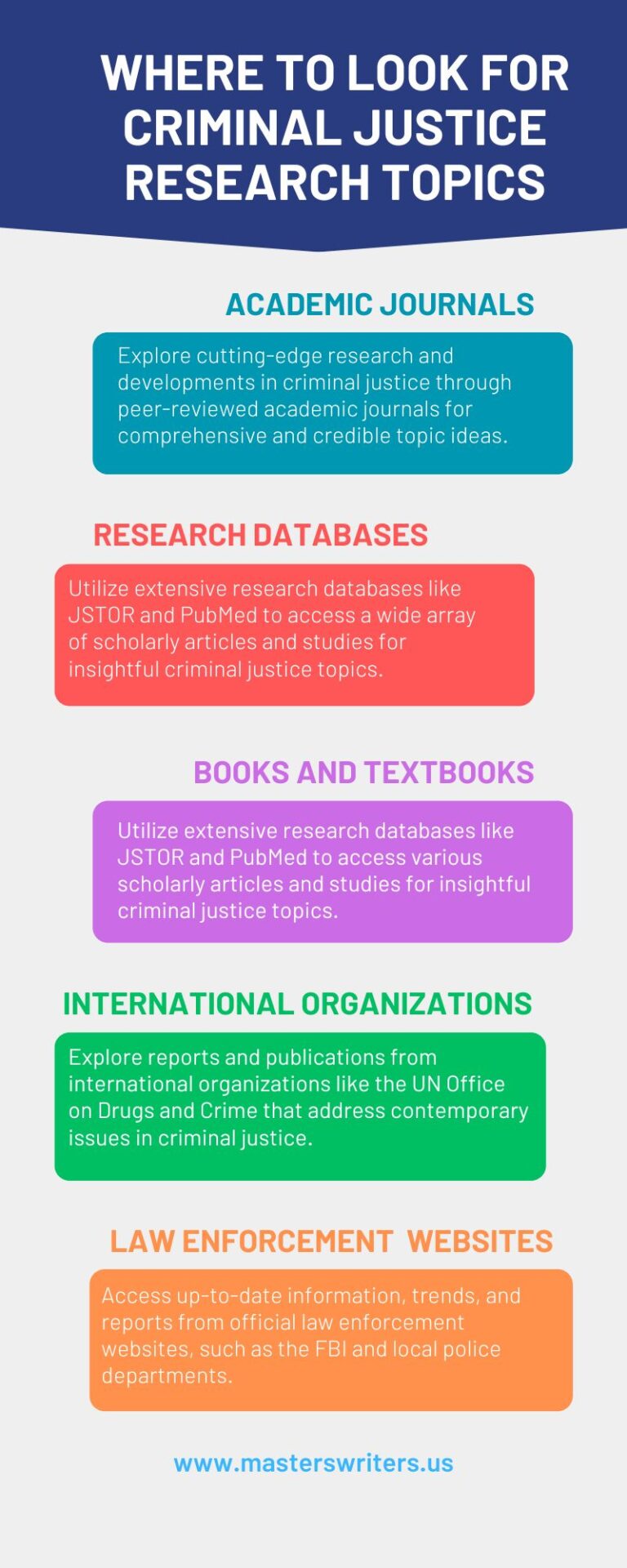Topics
Criminal Justice Research Topics: 150 Ideas for Your Law Essay


The criminal justice field is rich with captivating research topics that provide ample material for legal essays. This field allows for an in-depth exploration of the intricate dynamics within law enforcement, judiciary systems, and correctional institutions. Whether it’s investigating the success rates of various rehabilitation methods or examining the ethical considerations surrounding modern surveillance technologies, there are numerous compelling issues to analyze. In this article, we’ve compiled a list of 150 research topics to ignite your interest and support your scholarly inquiries into these intriguing aspects of criminal justice. If you’re short on time, our professional essay writers are here to assist you.
What is Research in Criminal Justice?
Research in criminal justice involves systematic investigation into the various facets of the criminal justice system, including law enforcement, legal processes, corrections, and criminal behavior. It aims to uncover patterns, test theories, and develop evidence-based practices to improve public safety and justice outcomes. This research can encompass a wide range of topics, from the efficacy of crime prevention programs to the impact of legislative changes on crime rates. Through rigorous analysis and empirical studies, criminal justice research seeks to inform policy, enhance practices, and contribute to a more effective and equitable justice system.
What Is Criminal Justice Research Paper
A criminal justice research paper is a scholarly document that delves into the diverse components of the criminal justice system, such as policing, judicial processes, corrections, and associated societal issues. These papers typically require extensive research, critical analysis, and the interpretation of relevant data, scholarly literature, and legal cases to address specific questions or themes within the field.
Topics in criminal justice research may evaluate the efficacy of policies or interventions, investigate trends in criminal activity, assess the consequences of judicial decisions, or propose solutions to contemporary challenges within the system. Moreover, these papers often contribute to broader conversations on crime prevention, rehabilitation, social equity, and the safeguarding of individual rights. Since you’ll need to rely on external sources for writing, read the guide on how to start a research paper for academic success.
What is a Good Research Question for Criminal Justice?
A good research question in criminal justice is precise, researchable, and significant. It should address a specific issue within the field, be capable of being investigated through empirical methods, and contribute to our understanding of criminal justice practices and policies. The question should be neither too broad nor too narrow and should stimulate further discussion and exploration. Below is a list of good research questions for criminal justice
- How effective are community policing strategies in reducing crime rates in urban areas?
- What are the impacts of mandatory minimum sentencing on prison overcrowding and recidivism rates?
- How do body-worn cameras affect the behavior and accountability of law enforcement officers?
- What are the long-term effects of juvenile detention on youth offenders’ reintegration into society?
- How do drug courts compare to traditional courts in terms of reducing substance abuse and criminal behavior among offenders?
- What role does socioeconomic status play in the likelihood of being arrested and prosecuted for similar offenses?
- How do restorative justice practices impact victim satisfaction and offender rehabilitation?
- What are the ethical implications of using predictive policing algorithms in law enforcement?
- How effective are reentry programs in assisting former inmates in securing employment and avoiding recidivism?
- What is the relationship between mental health issues and the likelihood of encountering the criminal justice system?
Why Students Write a Criminal Justice Research Paper
Students write criminal justice research papers for various reasons, all aimed at deepening their comprehension of the field and enhancing critical thinking and analytical skills. Primarily, these assignments enable students to investigate specific topics within the criminal justice system, allowing for a thorough exploration of areas that interest or concern them. Through this research, students can gain insights into the intricacies of law enforcement, judicial procedures, corrections, and societal reactions to crime. This detailed examination cultivates a greater appreciation for the complexities and challenges in the criminal justice field, equipping students for future roles in law enforcement, legal practice, policy development, or academia.
Additionally, criminal justice research papers help students improve their research and writing skills, which are crucial for academic and professional success. The research process involves collecting and critically analyzing relevant literature, data, and legal cases, enabling students to formulate well-supported arguments and conclusions.
Writing these papers also allows students to refine their ability to convey complex ideas clearly, organize their thoughts logically, and follow academic writing standards. Furthermore, the process of crafting research papers encourages students to engage in analytical, synthetic, and interpretive thinking, fostering their capacity to think critically and creatively about issues within the criminal justice system and beyond.

Want to Advance Your Criminal Justice Assignment?
For unique custom-written papers, take a look at our special features.
How to Choose a Good Research Topic Rules
Good criminal justice research topics are the driving force behind your research paper’s success, as they will underpin your exploration and guide the direction of your research. To choose a compelling research topic, consider the following steps:

Reflect on Your Interests
Begin by considering what aspects of criminal justice excite or concern you the most. Topics that align with your interests or values will likely keep you motivated and engaged throughout your research process.
Explore Existing Literature
Conduct an initial review of academic journals, books, and credible online sources to identify current trends, debates, and knowledge gaps in criminal justice. Look for topics with substantial existing research yet still present opportunities for further exploration.
Assess Relevance and Impact
Choose a topic relevant to ongoing issues or debates within the criminal justice system. Consider how your research could solve real-world problems, influence policy decisions, or enhance theoretical frameworks.
Focus Your Topic
After identifying a broad area of interest, narrow it to a specific research question or issue. A clearly defined focus will help you stay on track and ensure your research is manageable and in-depth.
Consider Feasibility
Evaluate the practicality of your chosen topic by considering the availability of data, resources, and expertise. Make sure your research question can be adequately addressed within the constraints of your time, budget, and available resources.
Seek Feedback
Consult with professors, advisors, peers, or criminal justice professionals about your research topic. Their insights can help refine your ideas, identify potential obstacles, and confirm that your topic aligns with your academic objectives. If peer and instructor feedback is insufficient, consider using a coursework writing service to produce a high-quality paper that meets all necessary standards.
Stay Adaptable
Be open to refining and adjusting your research topic as you progress. New insights, unexpected findings, or shifts in the research landscape may require you to tweak your focus to ensure your study remains relevant and insightful.
Criminal Justice Research Topics: The List
Selecting strong criminal justice research topics for college students is crucial as they are the cornerstone for significant academic investigation, guiding the field’s focus and extent of scholarly exploration. An appropriately chosen topic engages the researcher and carries importance into the broader discipline, presenting chances for novel insights, critical evaluation, and meaningful academic contributions. Opt for a custom essay, and our skilled writers will pick captivating and pertinent topics that can capture readers’ interest, enhance understanding, and tackle pressing issues or gaps in knowledge.
List of Criminology Research Topics
- The impact of social media on criminal behavior.
- Juvenile delinquency and its causes.
- The effectiveness of rehabilitation programs for offenders.
- The role of community policing in crime prevention.
- The relationship between poverty and crime.
- Cybercrime and its effects on society.
- The influence of family dynamics on youth crime.
- The role of forensic science in criminal investigations.
- The impact of drug laws on crime rates.
- Racial profiling in law enforcement.
- The effects of prison overcrowding on inmate behavior.
- The relationship between mental health and criminal behavior.
- Human trafficking and its impact on victims.
- The role of the media in shaping public perceptions of crime.
- The effectiveness of the death penalty in deterring crime.
- The link between gang culture and criminal activities.
- Domestic violence and its long-term effects on victims.
- The role of education in reducing recidivism rates.
- The impact of immigration laws on crime.
- White-collar crime and its impact on the economy.
List of Realistic Crime Research Topics
- Analyzing the effectiveness of community policing in reducing neighborhood crime rates.
- Evaluating the impact of mandatory minimum sentencing on prison overcrowding.
- Investigating the relationship between socioeconomic status and crime rates in urban areas.
- Examining the role of mental health services in preventing recidivism among ex-offenders.
- Assessing the impact of body-worn cameras on police accountability and public trust.
- Exploring the effectiveness of drug courts in reducing substance abuse and related crimes.
- Analyzing the influence of gang affiliation on youth crime and violence.
- Investigating the effects of solitary confinement on inmate mental health.
- Evaluating the success of rehabilitation programs for juvenile offenders.
- Assessing the impact of social media on the spread of criminal activity and law enforcement responses.
- Examining the role of forensic science in solving cold cases.
- Investigating the correlation between drug trafficking and violent crime rates.
- Evaluating the effectiveness of domestic violence intervention programs.
- Analyzing the impact of immigration policies on crime rates in border communities.
- Exploring the relationship between unemployment and property crime rates.
- Assessing the effectiveness of cybercrime laws in protecting personal data.
- Investigating the role of racial profiling in law enforcement practices.
- Evaluating the impact of restorative justice practices on victim satisfaction and offender rehabilitation.
- Analyzing the influence of media representation on public perception of crime.
- Exploring the challenges and solutions in combating human trafficking in major urban centers.
Supply Chain Management Research Topics
- How can blockchain technology improve transparency and security in supply chain management?
- What are the impacts of artificial intelligence on supply chain optimization and efficiency?
- How does supply chain resilience affect business continuity during global disruptions?
- What role does sustainable supply chain management play in reducing environmental impact?
- How can companies effectively integrate circular economy principles into their supply chain strategies?
- What are the challenges and benefits of implementing just-in-time (JIT) inventory systems in supply chains?
- How does digital transformation influence supply chain agility and responsiveness?
- What are the key factors driving the adoption of green logistics practices in supply chain management?
- How can data analytics and big data improve supply chain demand forecasting and inventory management?
- How do global trade policies affect supply chain strategies and operations?
- How can companies manage risks and uncertainties in global supply chains?
- What are the best practices for achieving supplier collaboration and relationship management?
- How does e-commerce growth impact traditional supply chain models and logistics?
- What strategies can be used to enhance supply chain visibility and traceability?
- How do cultural differences influence supply chain management in multinational corporations?
The Best Research Topics as A Criminology Student
- Analyzing the impact of community policing strategies on crime rates in urban neighborhoods.
- Examining the effectiveness of rehabilitation programs in reducing recidivism among juvenile offenders.
- Investigating the role of socioeconomic factors in influencing criminal behavior and incarceration rates.
- Exploring the ethical implications of using predictive policing technologies in law enforcement.
- Assessing the effectiveness of restorative justice practices in improving victim satisfaction and offender rehabilitation.
- Studying the impact of mandatory minimum sentencing laws on prison overcrowding and recidivism rates.
- Evaluating the role of mental health issues in the criminal justice system and their effect on sentencing and treatment.
- Investigating the relationship between substance abuse and criminal behavior among young adults.
- Examining the effects of racial profiling on community trust and police effectiveness.
- Analyzing the effectiveness of drug courts in reducing substance abuse and criminal activity among offenders.
- Exploring the impact of domestic violence laws on the protection of victims and the prosecution of offenders.
- Assessing the role of forensic science in solving cold cases and its impact on the criminal justice system.
- Studying the influence of media portrayal of crime on public perception and policy development.
- Investigating the challenges and solutions in addressing human trafficking within the criminal justice system.
- Evaluating the effectiveness of electronic monitoring and GPS tracking in reducing parole violations.
- Examining the impact of juvenile detention on future criminal behavior and social reintegration.
- Analyzing the role of eyewitness testimony in wrongful convictions and its implications for the justice system.
- Exploring the effects of prison education programs on inmate behavior and post-release employment opportunities.
- Investigating the relationship between gun control laws and violent crime rates in different regions.
- Assessing the effectiveness of anti-gang initiatives in preventing youth involvement in gang-related activities.
The Most Controversial Topics in Criminal Justice
- The ethical implications of using facial recognition technology in law enforcement.
- The impact of mandatory minimum sentencing on prison populations and judicial discretion.
- The effectiveness and morality of the death penalty in modern criminal justice systems.
- The role of race and racial bias in police stop-and-frisk practices.
- The consequences of for-profit prisons on incarceration rates and inmate treatment.
- The debate over defunding the police and reallocating resources to community services.
- The implications of body-worn cameras on police accountability and privacy concerns.
- The controversy surrounding the use of solitary confinement in correctional facilities.
- The effectiveness of rehabilitation programs versus punitive measures in reducing recidivism.
- The role of mental health courts in addressing the needs of offenders with mental illnesses.
- The impact of juvenile life without parole sentences on youth offenders and their rehabilitation.
- The influence of political pressure on prosecutorial discretion and decision-making.
- The challenges and ethics of using predictive policing algorithms to prevent crime.
- The effects of decriminalizing drug offenses on public health and safety.
- The balance between national security and individual privacy rights in counterterrorism efforts.
- The fairness and transparency of plea bargaining in the criminal justice process.
- The consequences of sex offender registries on reintegration and recidivism.
- The role of restorative justice practices in addressing harm and facilitating healing for victims and offenders.
- The impact of media coverage on public perception and the fairness of criminal trials.
- The debate over gun control laws and their effectiveness in preventing crime and ensuring public safety.
List of Good Criminal Justice Research Topics
- The impact of community policing on crime rates in urban neighborhoods.
- Evaluating the effectiveness of rehabilitation programs in reducing recidivism.
- The role of mental health courts in addressing the needs of mentally ill offenders.
- Examining the ethical implications of predictive policing technologies.
- The effects of mandatory minimum sentencing on prison overcrowding.
- The relationship between socioeconomic status and the likelihood of arrest and conviction.
- Assessing the impact of body-worn cameras on police accountability and behavior.
- The influence of media coverage on public perception of crime and justice.
- The challenges and benefits of implementing restorative justice practices in schools.
- Analyzing the effectiveness of drug courts in reducing substance abuse and related crimes.
- The role of forensic science in solving cold cases and wrongful convictions.
- Investigating the long-term effects of juvenile detention on reoffending rates.
- The impact of immigration policies on crime rates and community safety.
- Exploring the relationship between domestic violence and law enforcement response.
- The effectiveness of various prison education programs in reducing recidivism.
- The role of social media in modern criminal investigations.
- Examining racial disparities in sentencing and incarceration rates.
- The influence of gang affiliation on criminal behavior and community safety.
- Evaluating the use of solitary confinement and its effects on inmate mental health.
- The impact of legalizing marijuana on crime rates and law enforcement practices.
List of Easy Criminal Justice Research Topics
- Analyzing the role of community policing in enhancing neighborhood safety.
- Examining the impact of social media on modern criminal investigations.
- Investigating the effectiveness of rehabilitation programs in reducing recidivism rates.
- Discussing the ethical implications of using facial recognition technology in law enforcement.
- Evaluating the benefits and challenges of body-worn cameras for police officers.
- Exploring the relationship between socioeconomic status and crime rates.
- Assessing the effectiveness of drug courts in addressing substance abuse issues.
- Studying the influence of mental health on criminal behavior and the justice system’s response.
- Comparing the different methods of juvenile justice intervention and their outcomes.
- Investigating the effects of mandatory minimum sentencing on prison populations.
- Analyzing the role of forensic science in solving cold cases.
- Discussing the impact of wrongful convictions on the criminal justice system.
- Examining the relationship between media coverage and public perception of crime.
- Studying the effectiveness of restorative justice practices in reducing crime.
- Evaluating the use of probation as an alternative to incarceration.
- Exploring the challenges of addressing cybercrime in the digital age.
- Investigating the role of eyewitness testimony in criminal trials.
- Discussing the impact of privatized prisons on the criminal justice system.
- Examining the effectiveness of crime prevention programs in schools.
- Assessing the implications of decriminalizing certain drugs on public safety.
Criminal Justice Research Topics for College Students
- Analyzing the effectiveness of community policing strategies in reducing urban crime rates.
- Investigating the impact of mandatory minimum sentencing on prison overcrowding and recidivism.
- Examining the role of body-worn cameras in enhancing police accountability and behavior.
- Assessing the long-term effects of juvenile detention on youth offenders’ reintegration into society.
- Evaluating the comparative effectiveness of drug courts versus traditional courts in reducing substance abuse and criminal behavior.
- Exploring the influence of socioeconomic status on arrest and prosecution rates for similar offenses.
- Investigating the impact of restorative justice practices on victim satisfaction and offender rehabilitation.
- Analyzing the ethical implications of using predictive policing algorithms in law enforcement.
- Examining the effectiveness of reentry programs in helping former inmates secure employment and avoid recidivism.
- Studying the relationship between mental health issues and the likelihood of encounters with the criminal justice system.
- Evaluating the impact of privatization of prisons on inmate rehabilitation and correctional outcomes.
- Investigating the effectiveness of different types of rehabilitation programs in reducing recidivism rates.
- Assessing the impact of racial profiling on minority communities and its effectiveness in crime prevention.
- Examining the role of forensic science advancements in solving cold cases and wrongful convictions.
- Investigating the influence of media representation on public perception of crime and criminal justice policies.
- Analyzing the challenges and opportunities of implementing restorative justice in schools to address juvenile delinquency.
- Exploring the impact of immigration policies on crime rates and law enforcement practices.
- Examining the role of technology in enhancing courtroom procedures and legal proceedings.
- Assessing the effectiveness of domestic violence intervention programs in preventing repeat offenses.
- Investigating the impact of wrongful convictions on the lives of exonerated individuals and their reintegration into society.
List of Basic Criminal Justice Topics
- The impact of community policing on crime reduction in urban neighborhoods.
- The effectiveness of rehabilitation programs in reducing recidivism rates among offenders.
- The role of forensic science in modern criminal investigations.
- The ethical implications of using surveillance technology in public spaces.
- The challenges and benefits of implementing restorative justice practices in the criminal justice system.
- The influence of socioeconomic factors on crime rates and criminal behavior.
- The effectiveness of mandatory minimum sentencing laws in deterring crime.
- The role of juvenile justice systems in rehabilitating young offenders.
- The impact of mental health issues on criminal behavior and the criminal justice system.
- The effectiveness of drug courts in reducing substance abuse and criminal activity.
- The impact of racial profiling on community trust in law enforcement.
- The role of victim advocacy programs in supporting crime victims.
- The challenges of addressing domestic violence within the criminal justice system.
- The impact of prison overcrowding on inmate behavior and rehabilitation efforts.
- The effectiveness of electronic monitoring as an alternative to incarceration.
- The role of plea bargaining in the criminal justice system and its impact on justice outcomes.
- The challenges of reentry for ex-offenders and the role of reentry programs.
- The influence of media coverage on public perceptions of crime and justice.
- The effectiveness of various crime prevention strategies in reducing property crimes.
- The impact of gun control laws on reducing violent crime rates.
List of Criminal Justice Topics on Racial Discrimination
- Analyzing the impact of racial profiling in law enforcement practices.
- Examining the disparities in sentencing between different racial groups.
- Investigating the role of race in jury selection and trial outcomes.
- Evaluating the effectiveness of anti-discrimination policies in police departments.
- Assessing racial bias in stop-and-frisk practices.
- Exploring the relationship between race and wrongful convictions.
- Studying the effects of racial discrimination on juvenile justice outcomes.
- Investigating racial disparities in the application of the death penalty.
- Examining the influence of race on bail decisions and pretrial detention.
- Analyzing the impact of racial bias in criminal investigations.
- Assessing the role of race in the implementation of three-strikes laws.
- Investigating racial disparities in drug-related arrests and prosecutions.
- Exploring the effects of racial discrimination on prison conditions and treatment.
- Examining the influence of race on probation and parole decisions.
- Analyzing the impact of racial bias in police use of force incidents.
- Evaluating the effectiveness of community policing in reducing racial tensions.
- Studying the role of race in media coverage of criminal justice issues.
- Investigating the effects of racial discrimination on mental health outcomes in incarcerated populations.
- Exploring the relationship between race and access to legal representation.
- Examining the impact of implicit racial bias on law enforcement decision-making.
List of Crime Research Topics (Crime Types)
- Investigating the impact of cybercrime on personal and financial security.
- Analyzing the causes and consequences of white-collar crime in corporate settings.
- Exploring the effects of organized crime on local communities.
- Examining the psychological profiles of serial killers.
- Investigating the relationship between drug trafficking and violent crime rates.
- Analyzing the role of human trafficking networks in modern-day slavery.
- Exploring the connection between gang activity and juvenile delinquency.
- Examining the rise of hate crimes in contemporary society.
- Investigating the influence of social media on the proliferation of cyberbullying.
- Analyzing the effectiveness of laws against domestic violence.
- Exploring the relationship between poverty and property crimes.
- Investigating the factors contributing to the rise of mass shootings in the United States.
- Examining the impact of terrorism on national security policies.
- Analyzing the role of mental illness in the commission of violent crimes.
- Exploring the influence of cultural and social factors on honor killings.
- Investigating the effectiveness of rehabilitation programs for sex offenders.
- Analyzing the prevalence and consequences of police corruption.
- Examining the role of forensic science in solving cold cases.
- Exploring the impact of insider trading on the stability of financial markets.
- Investigating the effectiveness of international efforts to combat wildlife trafficking.
Final Thoughts
In conclusion, writing research papers in criminal justice is valuable for students. It allows them to comprehensively understand the criminal justice system and cultivate essential skills such as critical thinking, analytical reasoning, and thorough research. Engaging in this academic exercise prepares students for future careers and contributes to their ability to tackle complex issues and make informed decisions within the field.

Want to Impress Your Professor With a Flawless Paper?
We always have experienced essay writers on hand creating an outstanding paper depending on your specifications.
Selecting the appropriate criminal justice research topic ideas enables you to guide the focus of your study and maintain your enthusiasm and interest. By choosing a subject that excites you or is pertinent to contemporary issues, students can maximize their educational experience and potentially offer fresh perspectives to the legal field. If you struggle with this paper while juggling multiple assignments, consider buying a paper online to manage your workload more efficiently.


